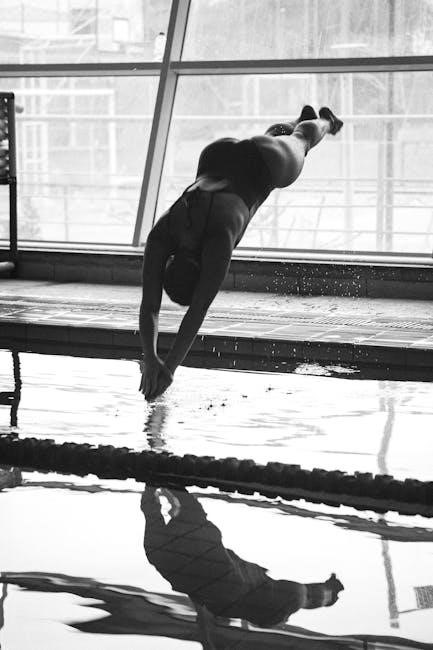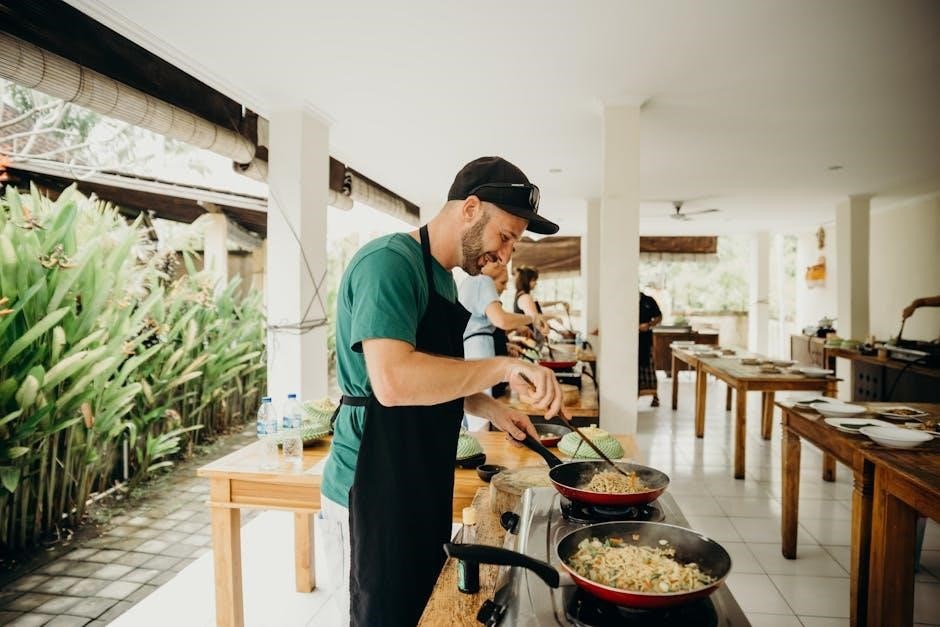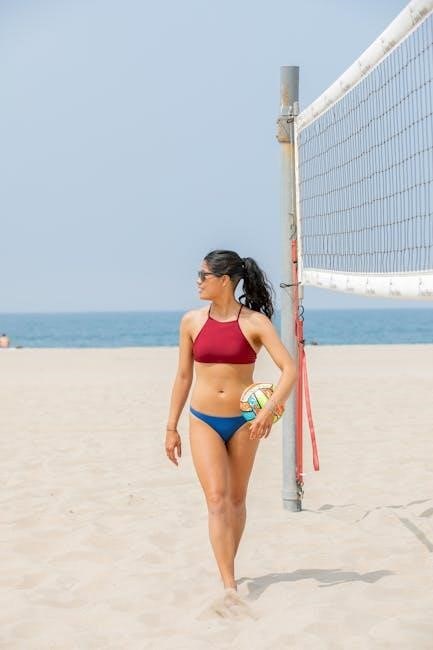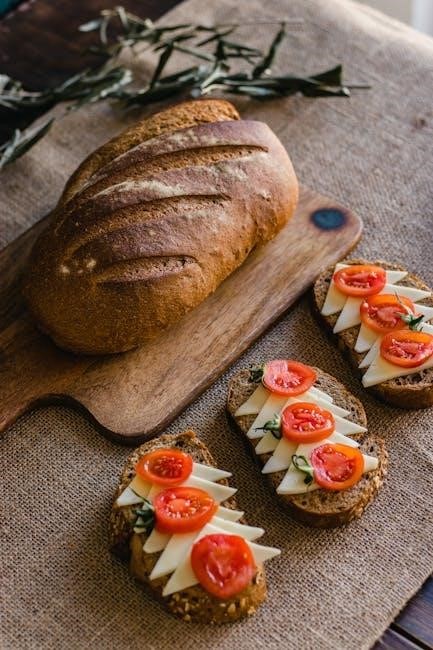A comprehensive guide to achieving your bikini competition goals, this PDF outlines a structured meal plan, emphasizing protein intake, meal frequency, and balanced nutrition for optimal results․
Overview of Bikini Competitions and the Role of Nutrition
Bikini competitions focus on aesthetic appeal, emphasizing a lean, toned physique with balanced curves․ Success in these events requires meticulous preparation, where nutrition plays a pivotal role․ A well-structured meal plan ensures athletes achieve the desired body composition while maintaining muscle mass and energy levels․ Proper nutrition helps manage fat loss, enhances recovery, and supports overall performance․ Competitors typically follow strict dietary regimens, focusing on high protein intake, balanced macronutrients, and hydration․ Tailored meal plans, avoiding restrictive diets, are essential for sustainability and peak conditioning․ Expert guidance is often sought to optimize nutrition strategies, ensuring athletes meet their goals effectively while maintaining health and vitality throughout their preparation journey․
Why a Structured Meal Plan is Essential for Success
A structured meal plan is crucial for bikini competition success, providing a clear roadmap to achieve specific physique goals․ It ensures consistent nutrient intake, supporting muscle preservation and fat loss․ By adhering to a tailored plan, athletes avoid guesswork, maintaining discipline and focus․ Portion control and balanced macronutrients prevent metabolic slowdowns, while strategic meal timing enhances performance and recovery․ A well-designed plan also reduces the risk of over-restricting, ensuring long-term sustainability․ Ultimately, a structured approach fosters accountability, helping competitors stay on track mentally and physically, leading to a polished, stage-ready appearance․

Key Principles of a Bikini Competition Meal Plan
A bikini competition meal plan focuses on balanced macronutrients, portion control, and hydration, ensuring optimal fat loss while preserving lean muscle and energy levels for training․
Importance of Protein in the Diet
Protein is a cornerstone of a bikini competition meal plan, essential for muscle preservation and recovery․ It helps maintain lean muscle mass while promoting fat loss․ Competitors typically consume 1․2–2․2 grams of protein per kilogram of body weight daily․ High-quality sources include lean meats, fish, eggs, tofu, and plant-based options like legumes․ Protein shakes are also popular for convenience and meeting daily targets․ Ensuring adequate protein intake supports muscle synthesis, reducing muscle breakdown during intense training․ A well-planned diet rich in protein helps competitors achieve a toned, athletic physique, crucial for stage presence․ Balancing protein with other macronutrients ensures sustained energy and overall health․
Meal Frequency and Portion Control
Meal frequency and portion control are critical components of a bikini competition meal plan․ Eating smaller, balanced meals throughout the day helps maintain metabolism and energy levels․ Typically, 5–6 meals are recommended, including breakfast, snacks, lunch, pre- and post-workout meals, and dinner․ Portion sizes should be tailored to individual calorie needs, ensuring adequate nutrition without overconsumption․ Tracking macros and calories is essential to stay on track․ Avoiding oversized portions prevents excess calorie intake, which can hinder fat loss․ By controlling portions and spacing meals evenly, competitors can optimize fat loss while preserving lean muscle․ This structure also helps maintain discipline and consistency, key to achieving competition-ready results․
Balancing Macronutrients: Carbohydrates, Proteins, and Fats
Balancing carbohydrates, proteins, and fats is vital for a successful bikini competition meal plan․ Carbohydrates provide energy, proteins support muscle growth, and fats aid hormone production․ A typical ratio might be 40% carbs, 40% protein, and 20% fats․ Adjustments are made based on individual goals and progress․ Prioritizing whole, unprocessed foods ensures optimal nutrient intake․ For example, complex carbs like brown rice and sweet potatoes, lean proteins such as chicken and fish, and healthy fats like avocados and nuts are recommended․ Balancing these macros supports fat loss, muscle retention, and overall performance․ Monitoring and adjusting macronutrient ratios ensures the body stays in a fat-burning state while maintaining muscle definition, crucial for competition success․
Advanced Strategies for Bikini Competition Prep
Hydration Strategies for Optimal Performance
Staying hydrated is crucial for performance and recovery․ Aim to drink 3-4 liters of water daily, adjusting for activity levels․ Timing water intake around workouts and meals can enhance results, while monitoring urine color ensures proper hydration levels․
Proper hydration is vital for both physical performance and aesthetic goals in bikini competition prep․ Aim to consume 3-4 liters of water daily, adjusting based on activity levels and sweat loss․ Timing water intake strategically, such as before and after workouts, can enhance endurance and recovery․ Additionally, incorporating electrolytes or coconut water during intense training sessions helps maintain electrolyte balance and prevents dehydration․ Avoid excessive water intake close to stage time to minimize bloating․ Herbal teas and low-sugar sports drinks can also contribute to hydration without adding unnecessary calories․ Tracking water intake through a hydration app or physical log ensures consistency and adherence to your goals․
Role of Supplements in Meal Planning
Supplements play a crucial role in enhancing nutrition and performance during bikini competition prep․ Multivitamins ensure nutrient deficiencies are addressed, while fiber supplements support digestion․ Probiotics promote gut health, aiding in nutrient absorption and reducing bloating․ L-glutamine helps with muscle recovery and immune function․ These additions complement a structured meal plan, ensuring athletes meet their dietary needs without excess calories․ However, supplements should not replace whole foods but rather augment them․ Consulting with a nutritionist is essential to tailor supplements to individual goals, avoiding over-supplementation․ A balanced approach ensures optimal performance, recovery, and aesthetic results, making supplements a valuable tool in competition preparation․
Timing of Meals for Maximum Efficiency
Meal timing is critical for optimizing metabolism, energy levels, and recovery in bikini competition prep․ Eating 5-6 smaller meals spaced evenly throughout the day helps maintain metabolic activity and prevents hunger․ Pre- and post-workout nutrition is particularly important, with a protein-rich meal or shake consumed 1-2 hours before training and within 30-60 minutes after to support muscle recovery․ Staying hydrated and avoiding heavy meals close to bedtime are also key․ Proper timing ensures nutrients are utilized efficiently, supporting fat loss and muscle maintenance․ A well-timed meal plan enhances performance, recovery, and overall progress toward competition goals․

Sample Meal Plan for Bikini Competition Prep
A structured plan featuring protein-rich breakfasts, lean lunches, and balanced dinners, with hydration tips and recipe ideas for optimal fat loss and muscle maintenance․
Breakfast Options for Competition Prep
Breakfast is crucial for starting your day right, providing energy and kickstarting metabolism․ Protein-rich options like egg whites, whole eggs, or Greek yogurt are ideal․ Pair with complex carbs such as oatmeal or whole-grain toast for sustained energy․ Add healthy fats like avocado or nuts for satiety․ Consider meal prepping overnight oats or protein pancakes for convenience․ Stay hydrated with water or green tea․ Aim for balanced macronutrients, with a focus on lean protein to support muscle retention and fat loss․ Keep portions controlled to align with your calorie goals․ Vary your recipes to avoid monotony while maintaining nutritional integrity․ A well-planned breakfast sets the tone for a disciplined competition prep day․
Lunch Ideas to Maintain Lean Muscle
Lunch should focus on protein-rich foods to support muscle retention and recovery․ Grilled chicken breast, turkey, or lean fish are excellent options․ Pair with complex carbs like quinoa, brown rice, or sweet potatoes for sustained energy․ Incorporate steamed vegetables such as broccoli, spinach, or asparagus for essential vitamins and fiber․ Healthy fats like avocado or nuts can enhance meal satisfaction․ Consider meal prepping salads with lean protein, mixed greens, and a light vinaigrette․ For variety, try wraps with whole-grain tortillas, lean beef, or tofu․ Portion control is key to staying within calorie goals while maintaining muscle mass․ Balanced and nutrient-dense lunches fuel your body for intense workouts and fat loss․ Consistency in meal prep ensures progress toward competition-ready physique․
Dinner Recipes for Fat Loss and Recovery
Dinner should prioritize lean proteins, healthy fats, and complex carbs to support fat loss and muscle recovery․ Grilled chicken breast, baked salmon, or turkey meatballs are excellent protein sources․ Pair with roasted vegetables like Brussels sprouts, zucchini, or sweet potatoes for fiber and nutrients․ Quinoa, cauliflower rice, or brown rice can provide sustained energy․ Incorporate healthy fats like avocado, olive oil, or nuts for satiety and hormonal balance․ Ensure meals are balanced and portion-controlled to maintain calorie goals․ Avoid heavy sauces and opt for herbal seasonings instead․ Meal prepping dinner recipes ensures consistency and adherence to your competition prep plan, promoting fat loss while preserving muscle mass for a toned physique․ Focus on whole, unprocessed foods for optimal results․

Common Mistakes to Avoid in Bikini Competition Meal Planning
Inconsistent meal planning, lack of variety, and failure to track progress often hinder success․ Avoid restrictive diets and ensure balanced nutrition for sustainable fat loss and muscle maintenance․
Over-restricting Calories and Nutrients

Over-restricting calories and nutrients is a common mistake in bikini competition meal planning․ Severely limiting food intake can lead to fatigue, muscle loss, and a slowed metabolism․ Competitors often believe that extreme calorie restriction accelerates fat loss, but it can hinder progress by depriving the body of essential nutrients․ Protein, carbohydrates, and healthy fats are vital for energy, muscle maintenance, and overall health․ A balanced meal plan ensures the body functions optimally, supporting both physical performance and aesthetic goals․ Avoiding excessive restriction promotes sustainable results and prevents long-term health issues․ A well-structured plan prioritizes nutrient-dense foods over extreme calorie cuts for a healthier, more effective approach to competition prep․
Neglecting the Importance of Meal Timing
Neglecting meal timing can undermine progress in bikini competition prep․ Proper timing ensures optimal nutrient absorption, energy levels, and metabolic efficiency․ Eating strategically around workouts, such as consuming protein and carbs post-exercise, aids in muscle recovery and growth․ Skipping meals or eating irregularly can lead to poor performance, increased hunger, and potential overeating․ A structured schedule helps maintain metabolic balance and supports fat loss; Competitors should align meals with their training routine and recovery needs․ Consistent timing also helps regulate hunger hormones, preventing cravings and promoting adherence to the meal plan․ By prioritizing timing, athletes can maximize the effectiveness of their nutrition strategy and achieve their competition goals more efficiently;

Tracking Progress and Adjusting the Meal Plan
Regularly monitoring progress and adjusting the meal plan ensures alignment with bikini competition goals․ Tracking macros, weight, and measurements helps identify areas for refinement, optimizing results effectively․
How to Monitor Progress Effectively
Effectively monitoring progress in a bikini competition meal plan involves regular tracking of weight, body measurements, and macronutrient intake․ Use a food diary to record daily meals and portions, ensuring adherence to your plan․ Weekly weigh-ins and progress photos can help visualize changes․ Measure key areas like waist, hips, and thighs to track fat loss accurately․ Additionally, track workout performance to assess strength and endurance improvements․ Adjusting your meal plan based on these metrics ensures you stay on course to meet your competition goals․ Consistency and patience are key to achieving desired results․
Adjusting Macronutrients Based on Results
As you progress in your bikini competition prep, adjusting macronutrients is crucial for optimizing results․ Carbohydrates may be increased for energy or reduced for fat loss, while proteins are maintained to preserve muscle․ Fats are tweaked for hormone balance and satiety․ Monitoring progress helps identify if adjustments are needed․ For example, if fat loss stalls, reducing carbs or increasing protein might help․ Conversely, if energy levels drop, a slight carb increase could be beneficial․ Regularly reviewing your macronutrient ratios ensures alignment with your goals․ Small, incremental changes allow for precise fine-tuning without drastic overhauls․ Always consult a coach to ensure adjustments support both performance and aesthetics effectively․

Integrating Fitness and Nutrition for Optimal Results
A well-structured meal plan combined with targeted fitness routines maximizes fat loss and muscle maintenance, ensuring a balanced approach to achieving bikini competition goals effectively․
How Workout Routines Support Meal Plan Goals
Workout routines play a crucial role in supporting meal plan goals by enhancing metabolism, boosting fat loss, and maintaining lean muscle mass․ A structured fitness regime complements nutrition by ensuring calories are burned efficiently, particularly during high-intensity interval training (HIIT) and strength sessions․ Consistent exercise helps create a caloric deficit while preserving muscle, which is essential for achieving the desired physique․ Tailored workout plans, including cardio and weightlifting, align with dietary intake to optimize results․ Regular physical activity also improves recovery, allowing competitors to adhere to their meal plans more effectively․ Over time, this synergy between fitness and nutrition fosters discipline and consistency, driving success in bikini competitions․
Mental Preparation and Discipline in Meal Planning
Mental preparation and discipline are cornerstone elements in successful bikini competition meal planning․ Competitors must cultivate a strong mindset to adhere to strict dietary guidelines, often requiring significant lifestyle adjustments․ Planning treat meals in advance helps maintain satisfaction and reduces cravings, while visualizing goals reinforces commitment․ A structured meal plan fosters accountability, minimizing deviations and ensuring consistency․ Additionally, tracking progress through journals or apps enhances self-awareness and motivation․ Mental resilience is crucial for overcoming challenges, such as social pressures or plateaus, and staying focused on long-term objectives․ By integrating mental strategies with nutrition, competitors build the discipline necessary to achieve their desired physique and succeed in the competition․
A well-structured bikini competition meal plan, combined with dedication and consistency, is key to achieving your goals․ Stay disciplined, embrace the process, and celebrate your hard work․
Final Tips for Success in Bikini Competition
Stay hydrated by drinking plenty of water throughout the day to support metabolism and recovery․ Incorporate supplements like whey protein or creatine to enhance performance․ Plan balanced meals with lean proteins, complex carbs, and healthy fats․ Avoid restrictive diets and opt for whole, unprocessed foods․ Schedule treat meals to maintain motivation without derailing progress․ Prioritize mental discipline and consistency in your nutrition plan․ Track your progress regularly and adjust your diet as needed․ Surround yourself with a supportive team, including a trainer and nutritionist, to guide your journey․ Remember, success in bikini competition is a combination of hard work, patience, and dedication to your goals․
Importance of Consistency and Patience
Consistency is key to achieving bikini competition goals, as it ensures gradual progress and adherence to your meal plan․ Skipping meals or workouts can hinder results․ Patience is equally vital, as transforming your physique takes time․ Avoid quick fixes and stay committed to your structured plan․ Regularly track progress to stay motivated and adjust strategies as needed․ Celebrate small victories to maintain morale and focus on long-term success․ Remember, consistency and patience are the foundation of a successful bikini competition journey, leading to sustainable results and personal growth․
